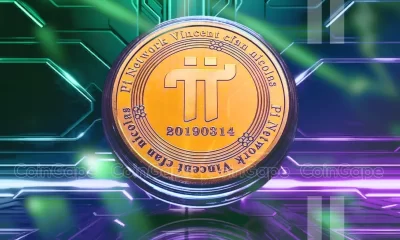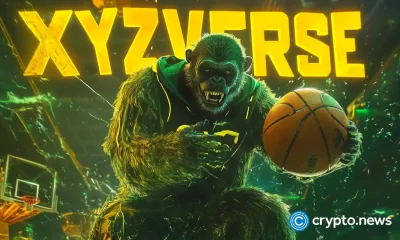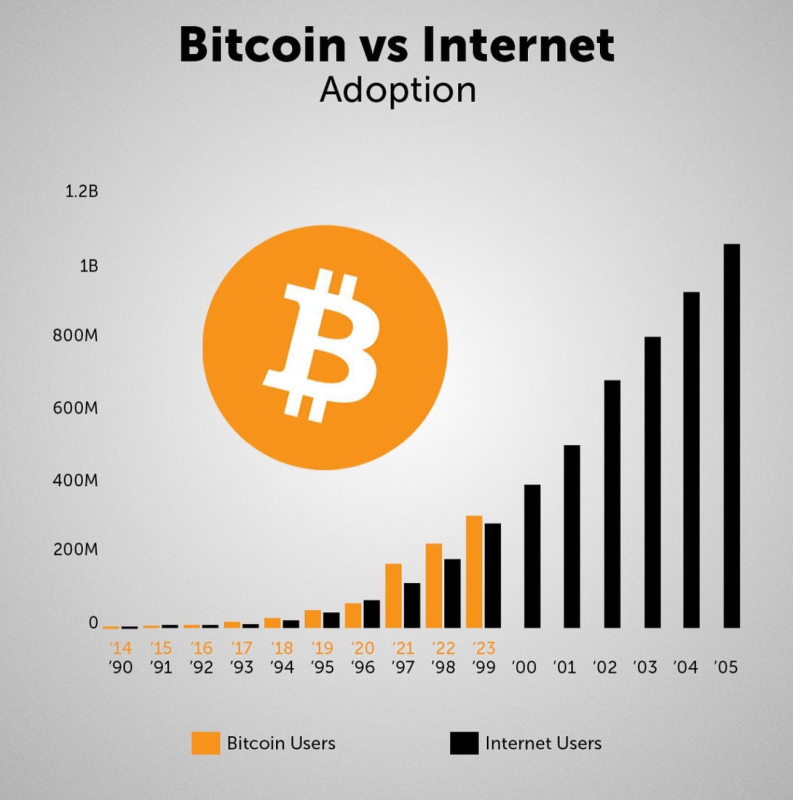Culture
The Degrowth of Bitcoin
Published
5 months agoon
By
admin

Austrian economics dominates the discourse on bitcoin, but it is not the only heterodox economic theory that describes the importance of a type of money that sounds strikingly like bitcoin. Aspects of degrowth and ecological economics promote an end to fiat and inflationary currencies. While we often focus on the benefits of bitcoin mining for the current energy transition away from fossil fuels, bitcoin has an even more important role to play in transitioning our societies to a sustainable and more equitable world.
Bitcoin’s energy consumption is both trivial and not trivial at the same time. The network consumes less than half a percent of the world’s electricity consumption. Some have called this nothing more than a “rounding error”. At the same time, it is hard to deny that this sliver of energy use is on the order of magnitude of the energy use of a small country. Of course, many global technologies are more energy intensive than Bitcoin; data centers, air conditioners, and the banking industry all come to mind.
There are valid reasons to worry about energy consumption and more than that, the potential for growing energy consumption. There’s enough peer-reviewed literature available on the internet that shows a definitive link between energy consumption and environmental degradation. From an ecological economics and degrowth perspective, this is generally a result of the neoclassical drive for never-ending economic growth.
The results of environmental degradation due to never-ending economic growth are obvious. Many scientists believe we’re in the midst of a sixth mass extinction that humans are primarily responsible for. A recent German study found a nearly 80% decline in insect biomass over the last 20 years. The Brazilian tropical forests, once one of our best carbon emission sinks, are now turning into carbon emission sources due to increased global temperatures and agribusiness-driven deforestation. Chemical pollution is everywhere. Microplastics were recently found in human blood samples and Monsanto’s Roundup can now be found in urine samples. All evidence that the bad incentive design of our existing economic system is pushing the planet far away from comfortable habitability, not just for humans but for all species.
The hard reality is that Bitcoin’s energy consumption will continue to grow for some time, assuming more and more people adopt bitcoin. If you’re worried about climate change and know the basic relationship between energy consumption, economic growth, and environmental degradation, then Bitcoin’s energy use does sound scary. The most important detail to understand about Bitcoin is that the network’s energy use is constrained and also essential for providing the kind of monetary system that will sustain a degrowth global economy.
Degrowth is a social, political, and economic movement. It’s a broad movement of people who advocate that the wealthiest countries reduce their overall energy consumption while allowing room for developing countries to raise theirs. There’s a growing call from the climate movement for the world to move away from economic growth and toward degrowth. Ecological economics provides a concrete foundation for how this would work through a convergence of degrowth-growth into an overall steady-state economy.
The steady-state economy is where our economy comes into line with what our planet is capable of sustaining. Contrary to what some may think, there are no species on this planet that can outgrow their habitat and survive for very long thereafter. Ecological economist Brian Czech calls a steady-state economy “economics for a full-world”; one where the economy has grown so big that it is pushing the environment to its limits.
Degrowth is more than steady-state economics and energy use, though. It also promotes an end to fiat, inflationary, and debt-based currencies. Degrowth encourages localism and frugal living that is in line with nature. One could argue that degrowth is exactly what Bitcoiner low-time preference looks like when applied across all aspects of the economy. Degrowth means eliminating wasteful consumerism, bullshit jobs, and rent-seeking. It also promotes indigenous methods of natural management and permaculture.
Indeed, if we want degrowth, then we have to build new infrastructure to sustain this low-time preference way of living. If we are going to eliminate fiat, inflation, and debt-based currencies, then we will need to build a robust, decentralized, and secure monetary network that we can use to keep our degrowth economic system in planetary check.
In Supply Shock: Economic Growth at the Crossroads, Czech explains that inflation happens “when a monetary authority (such as the Federal Reserve in the United States) increases the money supply faster than the real economy can grow”. Czech is not an Austrian economist but a full-on degrowther. He continues, “recent periods of rapid, real economic growth… have tended to result in inflation, because the monetary authorities are too removed from the realities of economic life to understand ecological limits to growth”.
From the ecological economics perspective, the origin of money is fundamentally a result of agricultural surplus; not debt, not the state. Although these certainly play a second-order role in the development and adoption of money, without agricultural surplus, there would be no division of labor, and without division of labor, there would be no need for exchange. Taken to the extreme, if our food systems completely collapsed this year, everything else would go with it and each of us would be back to spending most of our time finding enough food to survive; we would not need money.
From the first and second laws of thermodynamics, we know that energy is neither created nor destroyed and that when energy is converted the process is imperfect, and some of it dissipates. This means that these physical laws place an ecological limit on our planet that ultimately sets an upper bound on agricultural surplus. From an ecological economics standpoint, this means that money has a limit.
Bitcoin is money and it has a limit, too. In 2140, the last of 21 million bitcoin will be minted. In the early 2030s, 98% of all bitcoin will have been created. Bitcoin’s energy consumption grows so long as the value of bitcoin sustains its growth. At some point, if bitcoin becomes the world’s money standard, all the world’s value will be on the monetary network. When that happens, the growth of the network’s hash rate and thus energy consumption will have to slow down and likely reach a steady state of its own. This will happen because of diminishing returns as the network mining difficulty increases and competition is tight.
If ecological economic theory is right, then the total value of the Bitcoin network should reflect the full planetary limit to available resources that provide an agricultural surplus. Since we cannot create more energy, it must therefore be true that we cannot create more bitcoin. Our socio-economic system will have to buy into this idea of limits and that’s where the broader societal prescriptions from degrowth will be useful. In addition, there’s a saying in the bitcoin community; “you don’t change bitcoin, bitcoin changes you.” It’s possible that adopting bitcoin will turn people away from instant gratification consumerism, something bitcoiners colloquially refer to as high-time preference.
Because mining happens globally, we expect that energy consumption will grow during the period of economic convergence. If degrowthers, ecological economists, environmentalists, and climate activists get on board now, then they can help shape the future of where and how that energy consumption develops to make sure that it’s well distributed in regions of the world that are currently suffering from energy poverty. This will ensure that developing countries get the most benefit from the network’s growth and thus facilitate one part of the degrowth-growth steady-state convergence.
We are starting to see this play out. Bitcoin adoption is generally highest in less-developed countries where people are subject to hyperinflation, and unstable and repressive monetary regimes. Alongside that, governments in some developing countries like the Central African Republic are studying how to use bitcoin mining to develop their natural renewable energy resources. The newly elected president of Colombia, Gustavo Petro, a progressive-leaning politician, has also shown interest in using bitcoin mining for the same purpose.
Bitcoin is often criticized for rewarding early adopters over later adopters, and critics often claim that this will create a new class of crypto-oligarchs to rule the world. In a recent Bitcoin Policy Institute article called, “Is Bitcoin Fairly Distributed?”, the authors pointed to a recent CoinMetrics study that showed that despite “large institutions entering the space, bitcoin is still very much a grassroots movement,” and has the best distribution of currency when compared to alternative cryptocurrencies.
Money alone cannot solve the unequal distribution of resources, but if we couple money like bitcoin with a set of economic rules that reduce economic inequality (the book Radical Markets provides some reasonable market mechanism designs), then over time, the wealth will be fairly distributed among all people. Maintaining a society that is sustainable under a steady-state economy requires that we reduce all forms of inequality.
Believing that climate change is real is not necessary for adopting the above perspective. Limits to natural resources mean there’s a natural limit on oil. The United States reached peak oil production in the 1970s and the recent U.S. shale boom won’t last forever. As we’ve seen, energy independence is necessary for fortifying supply chains and promoting localism in our socio-economy. If we want a similar quality of life for future generations, then adopting bitcoin and perspectives from ecological economics and degrowth are essential for extending the best aspects of our current society out into the far future. Despite what critics say, bitcoin has a very important role to play here. While this is an incredible burden, it’s on us to get this message out to the rest of the world. The clock is ticking.
Source link
You may like


Metaplanet makes largest Bitcoin bet, acquires nearly 620 BTC


Tron’s Justin Sun Offloads 50% ETH Holdings, Ethereum Price Crash Imminent?


Investors bet on this $0.0013 token destined to leave Cardano and Shiba Inu behind


End of Altcoin Season? Glassnode Co-Founders Warn Alts in Danger of Lagging Behind After Last Week’s Correction


Can Pi Network Price Triple Before 2024 Ends?


XRP’s $5, $10 goals are trending, but this altcoin with 7,400% potential takes the spotlight


The Islamic conceptualisation of finance is built around a set of core principles which give primacy to honesty, fairness and accountability in trade and transactions. As such, Islamic finance seeks uphold justice, transparency, and shared prosperity in economic systems. Arguably, fiat currency achieves the exact opposite of these principles, since it introduces uncertainty, speculation and inequities that punish the poor, who earn and spend fiat, and favours the rich who invest in assets that benefit from inflation. In this backdrop, Bitcoin emerges as a solution that aligns remarkably well with Islamic finance principles. This article explores why Bitcoin, with its decentralization, transparency, and scarcity, represents the most Islamic form of money, offering transformative potential for the Muslim world.
The foundational principles of Islamic finance include:
1. Prohibition of Riba (Usury):
Interest-based lending, where money generates money without productive activity, is strictly forbidden in Islam. Riba fosters exploitation, concentrates wealth, and undermines social equity.
2. Prohibition of Gharar (Uncertainty):
Transactions should be free from undue speculation or ambiguity. Clear terms and honest practices are paramount.
3. Asset-Backed Economy
Trade and transactions should involve tangible assets or productive activities. Wealth must be earned through legitimate means, not through gambling or speculative bubbles.
4. Risk Sharing
Islamic finance emphasizes equity-based partnerships where profit and loss are shared, ensuring mutual benefit and fairness in all financial dealings.
5. Justice and Equity:
Wealth distribution should serve societal needs, promoting fairness and reducing economic disparities.
One could very credibly argue that the current fiat-based monetary system flagrantly violates these tenets. Central banks set interest rates that underpin the entire fiat system, institutionalizing usury. Money created out of debt inherently generates unearned profits for lenders while indebting others, fostering exploitation and inequality. The fiat system disproportionately benefits those closest to the source of money creation (e.g., banks, governments) at the expense of ordinary people. This “Cantillon Effect” exacerbates wealth inequality, violating Islamic values of equity and justice.
Fiat currencies are prone to inflation and devaluation due to their unlimited supply. This creates uncertainty and speculative behaviour, further destabilizing economies and harming the most vulnerable. Unlike gold or tangible assets, fiat money is not backed by any physical commodity. It is merely a promise of value, eroding trust and violating Islam’s emphasis on tangible, asset-backed wealth. Centralized control of money by a few institutions undermines accountability, fosters corruption, and allows governments to manipulate currencies to serve political agendas, often to the detriment of their citizens. These systemic flaws have led to financial crises, inequality, and the erosion of societal trust.
Bitcoin, the world’s first decentralized digital currency, aligns closely with the ethical and economic teachings of Islam. Bitcoin operates without interest-based mechanisms. Its decentralized nature ensures that no central authority can create money out of thin air or profit unjustly through usury. Every Bitcoin transaction is recorded on an immutable public ledger, the blockchain. This ensures honesty and accountability, eliminating the uncertainty associated with opaque fiat systems.
Bitcoin’s supply is capped at 21 million coins, making it a deflationary asset. Its scarcity mirrors the attributes of gold, historically accepted as sound money in Islamic societies. Unlike fiat money, Bitcoin is not controlled by any government or institution. Its decentralized network empowers individuals and fosters equity, aligning with Islam’s emphasis on justice and fairness.
Bitcoin is not a speculative promise; it is earned through “proof-of-work,” which requires significant energy and computational effort. This tangible cost of production imbues it with intrinsic value, resonating with Islamic financial principles. Bitcoin allows anyone with an internet connection to participate in the global economy. This inclusivity aligns with Islam’s vision of reducing economic barriers and promoting universal access to financial resources. Through its adherence to these principles, Bitcoin offers a viable alternative to the exploitative fiat system, paving the way for a more just and equitable financial future.
Adopting Bitcoin on a wide scale could revolutionize the Muslim world, unlocking unprecedented economic opportunities. Many Muslim-majority countries suffer from chronic inflation, eroding the value of their fiat currencies and impoverishing their citizens. Bitcoin’s deflationary nature provides a hedge against inflation, preserving wealth over time. Millions of Muslims remain unbanked due to lack of access to traditional financial services. Bitcoin’s decentralized system allows individuals to store and transfer wealth securely without relying on banks, fostering economic empowerment. Muslim-majority countries are among the largest recipients of remittances. Bitcoin enables faster, cheaper, and more secure cross-border transactions, reducing reliance on costly intermediaries.
By decentralizing money creation and eliminating the privileges of central banks, Bitcoin ensures a fairer distribution of wealth, addressing economic disparities that plague many Islamic societies. Bitcoin’s transparent system facilitates the development of Shariah-compliant financial products and services, promoting ethical investment opportunities in line with Islamic values. Bitcoin enables nations to reduce their dependence on the US dollar and other foreign currencies, strengthening their economic sovereignty and resilience. By enabling trustless, borderless transactions, Bitcoin fosters trade within the global Muslim community, encouraging innovation and economic integration across nations.
Bitcoin is more than just a technological innovation; it is a financial system rooted in justice, transparency, and equity—values deeply embedded in Islamic teachings. As the Muslim world grapples with the challenges of fiat-based economies, Bitcoin offers a path toward economic independence, financial inclusion, and societal prosperity. By embracing Bitcoin, the Muslim world can align its financial systems with the timeless principles of Islam, paving the way for a fairer and more sustainable future.
This is a guest post by Ghaffar Hussain. Opinions expressed are entirely their own and do not necessarily reflect those of BTC Inc or Bitcoin Magazine.
Source link
2024 Election
Bitcoin is Neither Racist, Xenophobic, nor Misogynistic: A Response to Ideological Stereotyping
Published
4 weeks agoon
November 27, 2024By
admin

Just hours after the U.S. election results were announced, I received messages from friends filled with striking assumptions. Some congratulated me, mockingly saying, “Congrats, your side won for Bitcoin.” Others expressed disapproval with remarks like, “It’s pathetic!” and “I’m shocked that Americans just voted for Hitler.” One friend said, “You were lucky to find safety in the U.S. as a refugee under Biden’s administration. Refugees and asylum seekers will now face a harder time here, but, hey, it’s still good for your Bitcoin.” Many of these friends work in high-level corporate jobs or are university students.
As a Green Card holder, I was not eligible to vote, but I recognize their huge disappointment in seeing their preferred candidate lose. Their frustrations were directed at me because they know I support Bitcoin and work in the space. I understand that making me a scapegoat says less about me and more about their limited understanding of what Bitcoin’s value represents.
I’m aware that in this highly polarized political landscape, ideological stereotyping becomes evident—not only during election season but also in spaces where innovative thinking should be encouraged. A prime example of this ideological bias occurred during the Ohio State University commencement, where Chris Pan’s speech on Bitcoin was largely booed by students attending their graduation ceremony. I admire the courage it took to stand firm in front of over 60,000 people and continue his speech. My guess is that most of these graduating students have never experienced hyperinflation or grown up under authoritarian regimes, which likely triggered an “auto-reject”’ response to concepts beyond their personal experience.
I’ve encountered similar resistance in my own unfinished academic journey; during my time at Georgetown, I had several unproductive conversations with professors and students who viewed Bitcoin as a far-right tool. Once a professor told me, “Win, just because cryptocurrency (he didn’t use the term Bitcoin) helped you and your people in your home country doesn’t make it a great tool—most people end up getting scammed in America and many parts of the world. I urge you to learn more about it.” The power dynamics in academic settings often discourage open-minded discourse, which is why I eventually refrained from discussing Bitcoin with my professors.
I’ve learned to understand that freedom of expression is a core American value. Yet, I’ve observed that certain demographics or communities label anyone they disagree with as ‘racist.’ In more extreme cases, this reaction can escalate to using influence to have people fired, expelled from school, or subjected to coordinated cyberbullying. I’m not claiming that racism doesn’t exist in American society or elsewhere; I strongly believe both overt and subtle forms of racism still persist and are well alive today.
Although bias and inequality remain widespread, Bitcoin operates on entirely different principles. Bitcoin is borderless, leaderless, and accepting of any nationality or skin color all while without requiring any form of ID to participate. People in war-torn countries convert their savings into Bitcoin to cross borders safely, human rights defenders receive donations in Bitcoin, and women living under the Taliban get paid through the Bitcoin network.
Bitcoin is not racist because it is a tool of empowerment for anyone who is willing to participate. Bitcoin is not Xenophobic because it gives those forced to flee their homes the power to carry their hard-earned economic energy across borders and participate in another economy when every other option is closed. For activists, often branded as ‘criminals’ by authoritarian regimes, it supports them through frozen bank accounts and blocked resources. For women, enduring life under misogynistic rule, Bitcoin offers a rare chance for financial independence.
Going back to the U.S. election context, Bitcoin not only levels the playing field for people in the world’s most forgotten places and darkest corners, but it also opens new avenues for U.S. presidential candidates to engage with this growing community. President-elect Donald Trump has made bold promises regarding Bitcoin, signaling a favorable policy. In contrast, Democratic candidate Vice President Kamala Harris’s campaign reportedly declined to support the Bitcoin community. Grant McCarty, co-founder of the Bitcoin Policy Institute, stated, “Can confirm that the Harris campaign was offered MILLIONS of dollars from companies, PACs, and individuals who were looking for her to simply take meetings with key crypto stakeholders and put together a defined crypto policy plan. The campaign never took the industry seriously.” I believe this is something most people may be unaware of, and confirmation bias often leads to the assumption that all Bitcoin supporters back every policy of the other side, including potential drastic changes to America’s humanitarian commitments such as refugee resettlement and asylum programs, anti-trafficking and protection of vulnerable populations, and foreign aid and disaster relief.
Most people around the world lack a stable economic infrastructure or access to long-term mortgages; they live and earn with currencies more volatile than crypto gambling and, in some cases, holding their own fiat currency is as dangerous as casino chips, or worse.
The Fiat experiment has failed the global majority. I believe that Bitcoin and Bitcoin advocates deserve to be evaluated on their merits and work on global impact, rather than through the binary lens of political bias, misappropriated terms, or factually flawed yet socially accepted diminutive categorizing, which allows them to opt out of learning and evaluating assumptions.
This is a guest post by Win Ko Ko Aung. Opinions expressed are entirely their own and do not necessarily reflect those of BTC Inc or Bitcoin Magazine.
Source link

Today’s modern Bitcoin exchanges have drastically improved access to Bitcoin ownership in 2024. Gone are the days of janky peer-to-peer (P2P) trade forums and questionably secure early exchanges like Mt Gox. Instead, a legion of Bitcoin on-ramps focused on superior security and user experience (UX) has made purchasing your first Bitcoin a breeze. Many of these services have even embarked on education-focused initiatives to encourage greater adoption during Bitcoin’s most recent bear market. In November 2023 Swan launched Welcome to Bitcoin, their free introductory 1 hour course about Bitcoin. In December 2023, Cash App released BREAD, a free, limited-edition magazine that uses design to tell stories and educate readers about Bitcoin in a relatable and accessible way.
What these initiatives show is that Bitcoin adoption is approaching a turning point. These two major Bitcoin exchanges, along with the industry as a whole, are discovering that easy access to a smash buy button does not guarantee purchase. Numerous barriers to entry still exist for nocoiners, which provide significant constraints to understanding Bitcoin, and thus throttle Bitcoin’s growth and adoption. As we approach a steeper incline in Bitcoin’s bell curve, throwing novices into exchange apps without sufficient education and cultivation is no longer a strategy for success.
What once was a far simpler task of energizing early adopters and cypherpunks around Bitcoin’s clear value proposition, is evolving into a more complex and convoluted process of orange-pilling the early majority of future Bitcoin holders. This, we hope, will then lead to widespread Bitcoin mass adoption as society en masse chooses to store its time and energy in the best money ever created. For this hyperbitcoinization to occur, more people need to understand the intricacies of Bitcoin. This is easier said than done because Bitcoin still has an education problem:
- An Economist Intelligence Unit study reported that 51% of people said a lack of knowledge is the main barrier to Bitcoin ownership.
- A YouGov survey found that 98% of novices don’t understand basic Bitcoin concepts.
- A nationwide survey from the Yale Center discovered that 69% of young people find learning boring.
This research outlines the struggle of onboarding and educating the next generation of Bitcoiners, most notably younger generations who have been shown to possess a limited attention span of 8 seconds. For inspiration to help solve this problem, we can look at one of the most popular mobile games of all time… Pokémon GO.
Pokémon GO was and remains to be, a global phenomenon. This beloved app caught the attention of Gen-Z, millennials, and Gen-X alike, boasting record-breaking engagement stats:
- In 2016, the game peaked at 232 million active players.
- Pokémon GO has grossed over $6 billion in revenue.
- In 2024, 24% of 18–34-year-olds in the US are playing Pokémon GO, while 49% of 35–54 year-olds are playing.
We at Jippi believe that the success of this award-winning game can illuminate the path forward for Bitcoin adoption. So we have set upon the electrifying task of building Tribe Clash–the world’s first Pokémon GO-inspired Bitcoin education game. The rules are simple, create or join a Tribe and battle for dominance over a city with your friends by catching a Bitcoin-themed Beast in every Territory.
Each week Jippi will release a new Territory to be claimed. A Tribe member will explore that Territory with their phone, where they will discover a Bitcoin Beast to catch. If they successfully answer all Bitcoin quiz questions correctly the fastest, they will then catch that beast. The Tribe with the most Territories and Bitcoin Beasts at the end of the game will win $30k worth of Bitcoin to be dispersed equally to each Tribe member.

Our vision is for Jippi to become the largest, most popular platform for beginners to gather, educate, and accumulate Bitcoin. We see Jippi as the most accessible on-ramp into the industry, where we can educate a whole new generation of Bitcoiners from novices to experts by lowering the barrier to entry.
You can support the development of Tribe Clash by contributing to our crowdfunding campaign on Timestamp. Timestamp enables investors of all backgrounds to support Bitcoin-only companies and make an impact. Our campaign is open to both the general public and accredited investors, so we would love for you to join us on this journey.
This is a guest post by Oliver Porter. Opinions expressed are entirely their own and do not necessarily reflect those of BTC Inc or Bitcoin Magazine.
Source link

Metaplanet makes largest Bitcoin bet, acquires nearly 620 BTC

Tron’s Justin Sun Offloads 50% ETH Holdings, Ethereum Price Crash Imminent?

Investors bet on this $0.0013 token destined to leave Cardano and Shiba Inu behind

End of Altcoin Season? Glassnode Co-Founders Warn Alts in Danger of Lagging Behind After Last Week’s Correction

Can Pi Network Price Triple Before 2024 Ends?

XRP’s $5, $10 goals are trending, but this altcoin with 7,400% potential takes the spotlight

CryptoQuant Hails Binance Reserve Amid High Leverage Trading

Trump Picks Bo Hines to Lead Presidential Crypto Council

The introduction of Hydra could see Cardano surpass Ethereum with 100,000 TPS

Top 4 Altcoins to Hold Before 2025 Alt Season

DeFi Protocol Usual’s Surge Catapults Hashnote’s Tokenized Treasury Over BlackRock’s BUIDL

DOGE & SHIB holders embrace Lightchain AI for its growth and unique sports-crypto vision

Will Shiba Inu Price Hold Critical Support Amid Market Volatility?

Chainlink price double bottoms as whales accumulate

Ethereum Accumulation Address Holdings Surge By 60% In Five Months – Details
182267361726451435

Why Did Trump Change His Mind on Bitcoin?

Top Crypto News Headlines of The Week

New U.S. president must bring clarity to crypto regulation, analyst says

Will XRP Price Defend $0.5 Support If SEC Decides to Appeal?

Bitcoin Open-Source Development Takes The Stage In Nashville

Ethereum, Solana touch key levels as Bitcoin spikes

Bitcoin 20% Surge In 3 Weeks Teases Record-Breaking Potential

Ethereum Crash A Buying Opportunity? This Whale Thinks So

Shiba Inu Price Slips 4% as 3500% Burn Rate Surge Fails to Halt Correction

Washington financial watchdog warns of scam involving fake crypto ‘professors’

‘Hamster Kombat’ Airdrop Delayed as Pre-Market Trading for Telegram Game Expands

Citigroup Executive Steps Down To Explore Crypto
Mostbet Güvenilir Mi – Casino Bonus 2024

NoOnes Bitcoin Philosophy: Everyone Eats
Trending

 3 months ago
3 months ago182267361726451435

 Donald Trump5 months ago
Donald Trump5 months agoWhy Did Trump Change His Mind on Bitcoin?

 24/7 Cryptocurrency News4 months ago
24/7 Cryptocurrency News4 months agoTop Crypto News Headlines of The Week

 News4 months ago
News4 months agoNew U.S. president must bring clarity to crypto regulation, analyst says

 Price analysis4 months ago
Price analysis4 months agoWill XRP Price Defend $0.5 Support If SEC Decides to Appeal?

 Opinion5 months ago
Opinion5 months agoBitcoin Open-Source Development Takes The Stage In Nashville

 Bitcoin5 months ago
Bitcoin5 months agoEthereum, Solana touch key levels as Bitcoin spikes

 Bitcoin5 months ago
Bitcoin5 months agoBitcoin 20% Surge In 3 Weeks Teases Record-Breaking Potential




